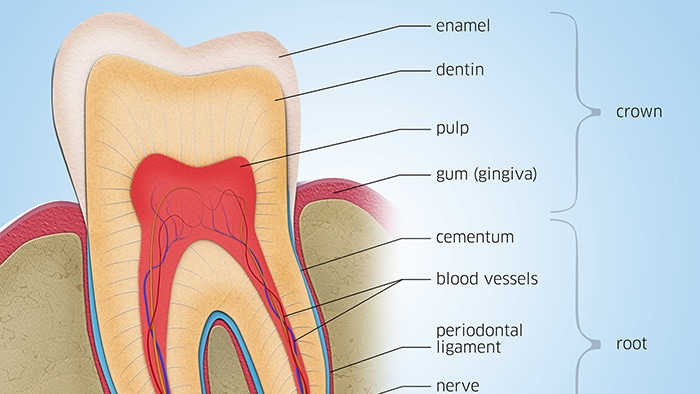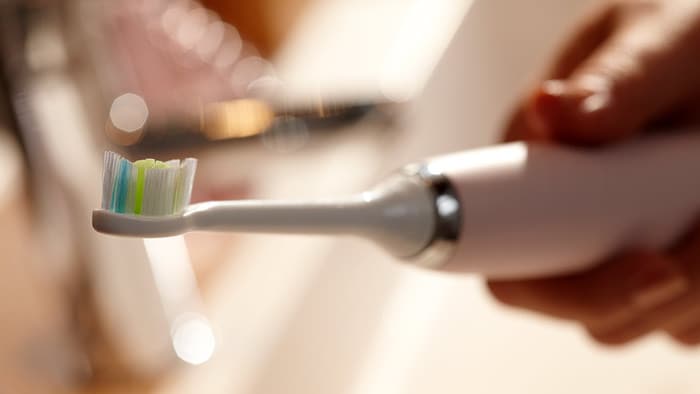What Causes Sensitive Teeth and How to Treat Them
What are sensitive teeth?
A hot cup of coffee or a cold scoop of ice cream aren’t normally cause for concern. For those with sensitive teeth, however, very hot or very cold temperatures can be very painful. When we experience pain in our teeth, we might blame the food we eat. It’s common to try to identify what food or drink could be causing pain and then eliminate that food or drink from our diets. But sensitive teeth aren’t as simple as that. Eliminating potentially painful foods from a diet can minimise the harm sensitive teeth cause you, but it won’t solve the root problem. Sensitive teeth are more a symptom than an issue themselves and can be a warning sign that you need to take extra care of your teeth.
What causes sensitive teeth?
Also known as dentine hypersensitivity, tooth sensitivity begins within the dentin—the sensitive layer and network of fluid-moving tubes that lies just beneath your enamel. If it becomes exposed, it can come into contact with foods, drinks, acids, sugars and plaque. These things can damage the dentin and cause harm. Dentin is normally protected by a hard enamel shell, and dentin itself surrounds the dental pulp, which is where all the essential nerves and blood vessels live. Because of the proximity to dental nerves, dentin can be quite sensitive. Enamel can be worn away by plaque and your dentin can be exposed to the elements. Because dentin is so sensitive, even a cold breeze can feel painful. The enamel on our teeth can be worn away by a lot of things. Excessive plaque, jaw grinding, abrasive whitening of the teeth, acidic mouthwashes, acidic foods, and bad fillings are all mild examples of tooth sensitivity causes. In more serious cases, something like gum disease could be at fault. Speak to your dentist to identify what the issue is and decide what you should do next.

How to treat sensitive teeth
If your sensitive teeth aren’t caused by a serious health issue, the best thing you can do is let the enamel grow back to protect your dentin. This means making sure your oral health is the best it can be to protect and care for your teeth. You should avoid especially acidic foods and mouthwashes that could be damaging your enamel. Cut down on the citrus and coffee. Speaking of damaging your teeth, don’t brush too hard. It’s unlikely you will brush too hard since forceful brushing would probably cause pain for sensitive teeth, but some people might still be too heavy handed with their toothbrush. If this is an issue for you, consider switching to an electric toothbrush with a pressure sensor, like the Philips Sonicare ProtectiveClean toothbrush, that lets you know when you’re brushing too hard. As you cut out potentially harmful things from your diet, you can bring in food and drink that can help your teeth. Fibre-rich fruit and veggies, cheese, milk, and plain yoghurt can all help to encourage saliva production. We need saliva because it rinses our mouths and washes away bacteria that can harm our enamel.
What you need

Philips Sonicare S Sensitive 3 x Standard sonic 3 toothbrush heads
HX6053/63
Ultra-sensitive cleaning. Ultra-soft comfort.
The Philips Sonicare S Sensitive toothbrush head is perfect for those who seek relief from painfully sensitive teeth and gums. You'll get an effective clean that's easy on your gums.
See all benefitsUnfortunately this product is no longer available
How to manage sensitive teeth
Now you know how to help your teeth get back to a healthy level of enamel, but the pain can still be present. The first thing you should do is swap out your regular toothpaste for a sensitive teeth toothpaste. If you’re looking at how to get rid of sensitive teeth, sensitive teeth toothpaste is essential. There are plenty of toothpaste options that are designed to help minimise the pain caused by extreme sensations. Then, continue to avoid trigger foods. There’s no point in having a scoop of ice cream if it’s just going to hurt. Sensitive teeth require sensitive care, so go easy on your teeth. Brush gently and take it slow when you floss. There’s no rush when it comes to proper oral health care. If string floss is causing you pain, try an electric flosser like the Philips Sonicare Power Flosser.

How to prevent sensitive teeth
When looking at how to stop sensitive teeth, the best thing you can do is to prevent the sensitivity all together. We know that sensitive teeth are often a symptom of enamel loss. What causes enamel loss is excessive plaque build-up. Plaque can sit in your mouth and develop harmful bacteria. Regular brushing, flossing, tongue scraping, and using mouthwash can all help to reduce plaque and bacteria in the mouth.Reducing plaque and bacteria can, in turn, prevent sensitive teeth.We recommend following an oral hygiene routine. When you wake up, first scrape your tongue and brush your teeth. Throughout the day, drink plenty of water. At the end of the day, floss then your brush your teeth in the evenings.

Philips has a range of products designed for optimal oral health. Philips Sonicare tongue brush heads fit on a Sonicare toothbrush base and give you a superior tongue clean with their specially designed MicroBristles. For a superior teeth clean we recommend using our Philips Sonicare DiamondClean Smart toothbrushes which come with an app to take the guesswork out of proper dental care. Regular visits to the dentist will also help you keep your teeth healthy. Your dentist won’t be able to offer a tooth sensitivity treatment, since tooth sensitivity itself isn’t a health issue. They may be able to treat the issue causing sensitivity though and relieve some of the discomfort you may be experiencing. If you’re ever concerned about your oral health, speak to your dental professional for advice.











